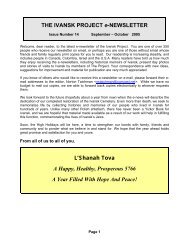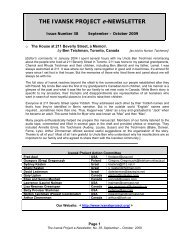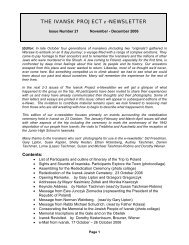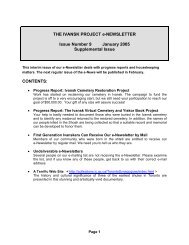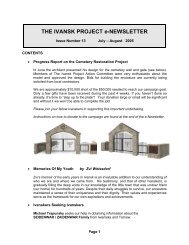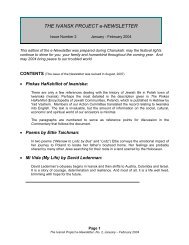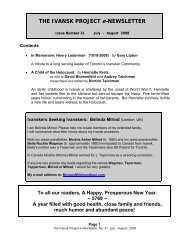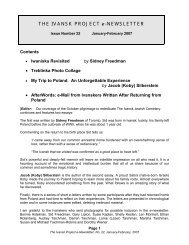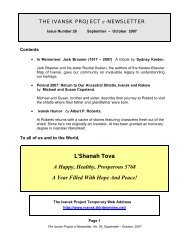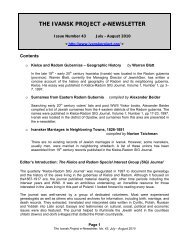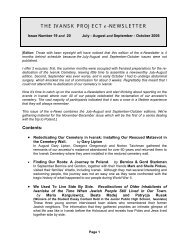51 - Ivansk: Our Jewish Heritage in Poland
51 - Ivansk: Our Jewish Heritage in Poland
51 - Ivansk: Our Jewish Heritage in Poland
- No tags were found...
Create successful ePaper yourself
Turn your PDF publications into a flip-book with our unique Google optimized e-Paper software.
Conditions <strong>in</strong> <strong>Poland</strong> and <strong>Ivansk</strong> Before World War IIWith the end of World War I, <strong>Poland</strong> rega<strong>in</strong>ed its <strong>in</strong>dependence. Soon after, she was attacked bythe Soviet Union. The Poles put up strong resistance push<strong>in</strong>g back the mighty Russian army.Initially, the country appeared to ga<strong>in</strong> ground on the economic front, and civil liberties wereguaranteed for the nation’s m<strong>in</strong>orities. Jews enjoyed freedom as never before and several sat <strong>in</strong>the Polish parliament, the Sejm. However, nationalistic political movements were ga<strong>in</strong><strong>in</strong>gmomentum and anti-<strong>Jewish</strong> sentiments were heard on the streets and <strong>in</strong> government. Theeconomy also began to faulter and politicians provided no solutions. The threat of anarchy andrevolt were very real.Impatient with the lack of political will Józef Piłsudski, the renowned marshal of the army <strong>in</strong> thePolish-Soviet War, staged a military coup <strong>in</strong> 1926. He assumed dictatorial command of the nation,restor<strong>in</strong>g order and stabiliz<strong>in</strong>g the economy. He tried to muffle those who advocated punitivemeasures aga<strong>in</strong>st Jews, but was only moderately successful <strong>in</strong> block<strong>in</strong>g anti-Semitic legistlation.After Piłsudski’s death <strong>in</strong> 1935 nationalistic fervor erupted with a vengeance and social, politicaland economic discrimation aga<strong>in</strong>st the <strong>Jewish</strong> m<strong>in</strong>ority became official policy. For <strong>in</strong>stance, lawswere enacted prohibit<strong>in</strong>g kashrut; distribution of funds to the gmilot hesed (welfare) associationswas curtailed, and Jews were segregated or prohibited from <strong>in</strong>stitutes of higher learn<strong>in</strong>g. Mobviolence and boycotts were commonplace. And like the Nazis, Polish legistlators even explored theidea of forc<strong>in</strong>g Jews to leave the country. But <strong>in</strong> the late 1930s the doors to western countries weresealed aga<strong>in</strong>st immigration. Dur<strong>in</strong>g the Great Depression, as storm clouds were brew<strong>in</strong>g <strong>in</strong> Europe,the US and Canada became <strong>in</strong>creas<strong>in</strong>gly isolationist and xenophobic, and only a few immigrantswere permitted to enter even on the most extreme humanitarian grounds. There was no way outfor the Jews.As conditons deteriorated it became difficult for my father to provide for his family. Even bread wasscarce. Then, when it seemed that life could get no worse, a fire ravaged the town. People took tothe streets carry<strong>in</strong>g their “bet givants” (down duvets, otherwise known as an “ibberbets”).My father considered go<strong>in</strong>g to Łódź to f<strong>in</strong>d work, but my grandfather tried to persuade him to stay.My father sought the counsel of the Shedlover rabbi who approved his plan. So, my father wentalone to Łódź but at first was unable to send money back to <strong>Ivansk</strong>. The family was close tostarvation. These were the worst times of my life <strong>in</strong> <strong>Ivansk</strong>. My father had to save money to rent anapartment <strong>in</strong> Łódź and to buy tickets for the family to come to Łódź. Even now I cannot imag<strong>in</strong>ehow we ever survived as we did not have money to buy even bread. After several months myfather had enough money to send for some members of the family. When more money was saved Ifollowed with my mother. At that time, I started to pa<strong>in</strong>t and we had a normal, comfortable, andeven prosperous, life.In September 1939 the Germans <strong>in</strong>vaded <strong>Poland</strong>. My brother Melech as well as his new wife andmy three sisters stayed <strong>in</strong> <strong>Ivansk</strong>. At the beg<strong>in</strong>n<strong>in</strong>g we could still correspond with them until wewere pushed <strong>in</strong>to the ghetto (late April 1940). We stopped hear<strong>in</strong>g from them once we were sent tothe ghetto. Melech and his wife had a baby. As far as we know none of them survived. My brotherAlter, who went to Łódź with my father, got sick and was taken to the hospital <strong>in</strong> Łódź. Alter nevercame home. There was an epidemic of typhus <strong>in</strong> the ghetto and a lot of people died at that time.Conditions <strong>in</strong> <strong>Poland</strong> deteriorated rapidly as the Germans exploited and brutalized the population.All semblance of normal life disappeared. Jews were forced <strong>in</strong>to work camps and ghettos. Yideland his family were locked <strong>in</strong>to the Łódź ghetto, the largest <strong>in</strong> <strong>Poland</strong>. Because of its manufactur<strong>in</strong>gbase, Łódź was annexed <strong>in</strong>to the Wehrmacht.Page 5The <strong>Ivansk</strong> Project e-Newsletter, No. <strong>51</strong>, November - December 2011



